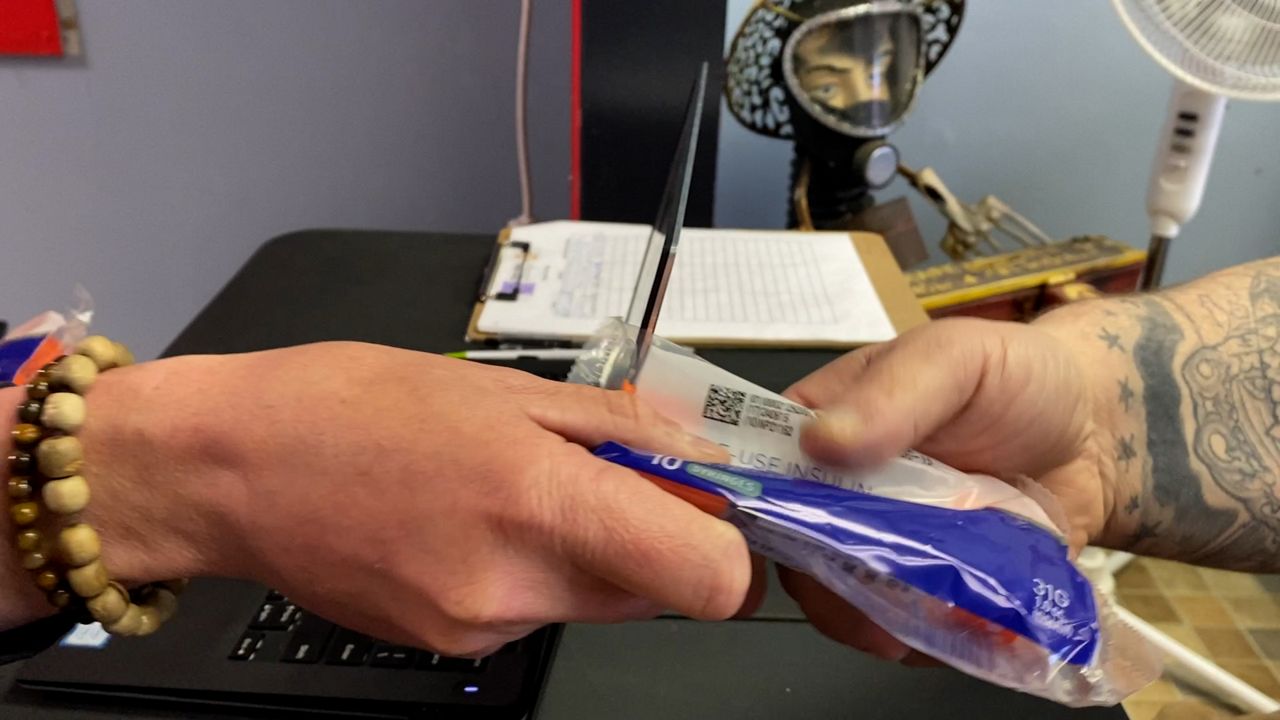PORTSMOUTH, Ohio — On Monday afternoons, seated at a small fold-up table behind a laptop, Rev. Paul Bennett said he does his most important ministry.
The Episcopal priest starts his shift kissing an icon of Jesus Christ and the Virgin Mary, then turns his attention to the steady stream of traffic walking in, waiting for him to hand them a week’s worth of clean syringes.
“Any overdose since your last visit?” Bennett asked every client. “Have you had to use any Narcan on anyone recently?”
A frequent volunteer at Portsmouth’s syringe service program, Bennett said he’s become a passionate advocate for reducing stigma surrounding drug use, especially in religious circles.
“We’re supposed to be people that are caring for the vulnerable and forgotten in society, and here in Portsmouth, that looks a lot like people who use drugs,” he said.
“This touches almost everybody”
Growing up in West Virginia, Bennett said he was in high school when he first saw the way heroin use could overtake a community.

Bennett hands off a bag of clean syringes. (Michelle Alfini/Spectrum News 1)
“I lost a lot of friends to it, and so I held my own sort of there’s a line that you shouldn’t cross-view,” he said.
Then in seminary, as he was studying at a church in Washington, D.C., he saw a parishioner suffer an overdose, and without Narcan, he and the rest of the clergy staff realized they lacked the tools and training to help.
“We had all the first aid stuff that we were supposed to have. If someone was having a heart attack, we knew what to do,” he said. “But we were caught up short in that moment.”
That’s when Bennett started looking into carrying the overdose-reversing drug, Narcan, himself, but he was surprised to learn how difficult it was to obtain.
“We could only get a handful of doses a year, and we had to become certified trainers to get that,” he said. “And so we did.”
Bennett and his fellow clergy members started holding Narcan training at the seminary, and even then, he said he got some pushback from community members and even clergy, who believed the church should separate itself from drug users.
“That’s a shame, unfortunately, clergy have really looked the other way on this,” he said. “This touches almost everybody in one way or another.”

Bennett prepares for Palm Sunday Service. (Michelle Alfini/Spectrum News 1)
How Portsmouth changed everything
In 2020, Bennett got his first assignment as a new priest at All Saints Episcopal Church in Portsmouth, where he planned to continue his work with Narcan distribution. Within a few months, though, he learned there was far more he could do in the realm of harm reduction.
“I didn’t have that vocabulary before I came to Portsmouth,” he said. “Up until now, I was just skimming the surface.”
Abby Spears, the injury prevention coordinator at the city health department, introduced Bennett to the city syringe exchange, where 200-300 people every week come to drop off used needles, pick up clean syringes and check in with volunteers.
“Every person here in the community that walks through those doors there, we’re just trying to survive,” Spears said.
The primary goal of the exchange is to reduce the spread of blood-borne pathogens, by eliminating the need to share needles, but Spears said the exchange also serves as an informal way to provide a beacon of hope for drug users who may face stigma anywhere else they may go.
“Many people, you know, they have been isolated because of the drugs that they use and people just need connection,” she said.
The exchange also provides free access to Narcan, which Spears credits as one of the greatest lifesavers in the city.
Self-reported data from the clients at the exchange showed they had conducted 1,617 naloxone reversals in 2021.
“That is just a flabbergasting number,” Spears said. “That means that so many people were given the opportunity to live.”
Bennett arrived one afternoon in his white collar, sat down to help serve their clients, and has been coming back ever since.
“I’m constantly surprised by the love and charity I see from the clients that I work with,” he said.
Helping or hurting?
Harm reduction remains a controversial strategy in the realm of intravenous drug use. Many see the practice as enabling because it supplies drug users with the materials to keep using.
For that reason, Licking County banned syringe exchanges in 2019, and state and federal laws restrict who can distribute safe drug-use supplies and how.
Abstinence-only programs are a popular alternative, arguing users should be diverted to recovery programs or jail if they’re found using or officials are called to the scene of an overdose.
Spears and Bennett believe those programs deter drug users from calling for help or burden the criminal justice and recovery systems with people who aren’t ready or interested in undergoing treatment.
Currently, 22 of Ohio’s 88 counties have syringe exchange programs and even fewer have access to materials, such as fentanyl test strips. So far, Portsmouth has been unable to incorporate those into their street-level services.
“Small communities like mine and programs that run like this have been left to shoulder the burdens created by bad policy,” Spears said.
Bills like SB 236, introduced in March, offer opportunities to ease some of those legal hurdles. The bill, co-sponsored by Stephen Huffman (R-Tipp City) and Nathan Manning (R-North Ridgeville), aims to make it easier to distribute Narcan and fentanyl testing strips.
Life enablers
Bennett has little patience for criticism of harm reduction tactics.
“I would say tell them that they’re wrong,” he said. “We’re really trying to make sure that people see that the only reason, the only way that this region can be lifted up, is if everybody’s lifted up together.”
The reason why Bennett said he comes back to the service center week after week is written on the walls. Hundreds of names scrawled out in sharpie are memorialized there.
“Real lives that are mothers and fathers that don’t see their kids anymore,” he said.
Bennett said it started organically. Person after person, client after client started adding names of people who died from an overdose around the region, hoping to provide some small way to honor lives cut short.
“It’s why we do this work,” he said. “Unfortunately, names keep being added, and they don’t need to be.”
In 2021, 5,083 Ohioans died from drug overdoses and Scioto County, which encompasses Portsmouth, had the highest death rate per capita, according to Harm Reduction Ohio.
“Someone called us life enablers,” Bennett said of the exchange. “And I think that’s fitting. It’s a time in which I feel folks can be treated with dignity and love.”

Bennett looks at the memorial wall at the syringe service program. (Michelle Alfini/Spectrum News 1)
The role of religion
Besides his hands-on work at the syringe exchange, Bennett sees his greatest calling in his work to bridge the gap between religious leaders and drug users.
The first time he wore his collar to the exchange, Bennett said the clients were wary of him. Many asked if he was going to convert them or force them to go to church. Bennett told them no. Instead, he’s hoping the opposite happens.
“I think as clergy folks, we have a really important role,” he said. “We say that we’re supposed to look out for the poor, the suffering, the imprisoned, the marginalized and I think in this country, drug users equate to almost all of that.”
Bennett said as spiritual healers, religious leaders should extend their services to those in active addiction in a loving, nonjudgemental way. For him, that looks like exchanging syringes, supplying Narcan and extending respect to everyone who comes into the exchange.
“In its best place, religion can help with that. In its worst place, we stigmatize and shame and make people feel more isolated and more disconnected and feed that addiction.”
Bennett’s time in Portsmouth will come to an end in May, as he’s been reassigned to work for another parish in the Baltimore area, but he plans to continue his harm reduction work in his next community, using the lessons he’s learned in Portsmouth to attract even more clergy to the cause.
“That’s why we need people like Father Paul,” Spears said. “People who are leaders in a way and can go out and change that larger public perception.”




